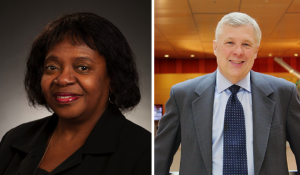This month, Mary Ann Villarreal, the U’s inaugural vice president for Equity, Diversity, and Inclusion, invited a team from the University of Michigan to facilitate a series of focus groups on campus. Betty Overton and John Burkhardt have extensive experience developing and funding new programs, and deepening institutional commitment to equity, diversity and inclusion. Villarreal asked that they meet with several members of the U community, share their findings and help further develop an action plan for the new division.

Betty Overton and John Burkhardt conducted several focus groups at the U to help further develop an action plan for Equity, Diversity, and Inclusion.
Nearly 60 people from across campus including U of U Health, academic affairs and student affairs participated in one of six focus groups over two days. They were asked to come to the discussion prepared to speak about successes, challenges, concerns and hopes for the university community and their own office or department. Each group of about 10 people shared with Overton or Burkhardt for 75 minutes.
“The focus groups were great,” said Meligha Garfield, director of the U’s Black Cultural Center. “Participating allowed me to gain a better perspective of what other organizations and departments are thinking as we look at the broad state of equity, diversity and inclusion on our campus. I am hopeful that some practical measures come out of the focus groups.”
In addition to staff and faculty, several students weighed in on how they view the current campus climate and what they hope to see in the future.
Overton and Burkhardt will hold two additional focus groups for those who were unable to attend one of the first six. Once those are complete, they will analyze the qualitative data they receive from each discussion group and provide recommendations for future initiatives and next steps to guide campus leadership. They expect to furnish their findings by mid-April.
“We are building on a legacy of social justice and activism that created institutional accountability and now are weaving ideals of equity, diversity and inclusion across the university,” said Villarreal. “But this work is very complex and has to work across numerous tensions. To fully realize the goals for this work across campus, we need a close examination of the strengths and opportunities of our institutional culture and structures. The focus groups were designed to give us a window of opportunity for taking the next steps on this long road to cultural transformation.”
Villarreal said she plans to share the findings with senior university leaders, divisional senior leadership, university committees and student groups. She said it will help inform how they prioritize the important work ahead.
